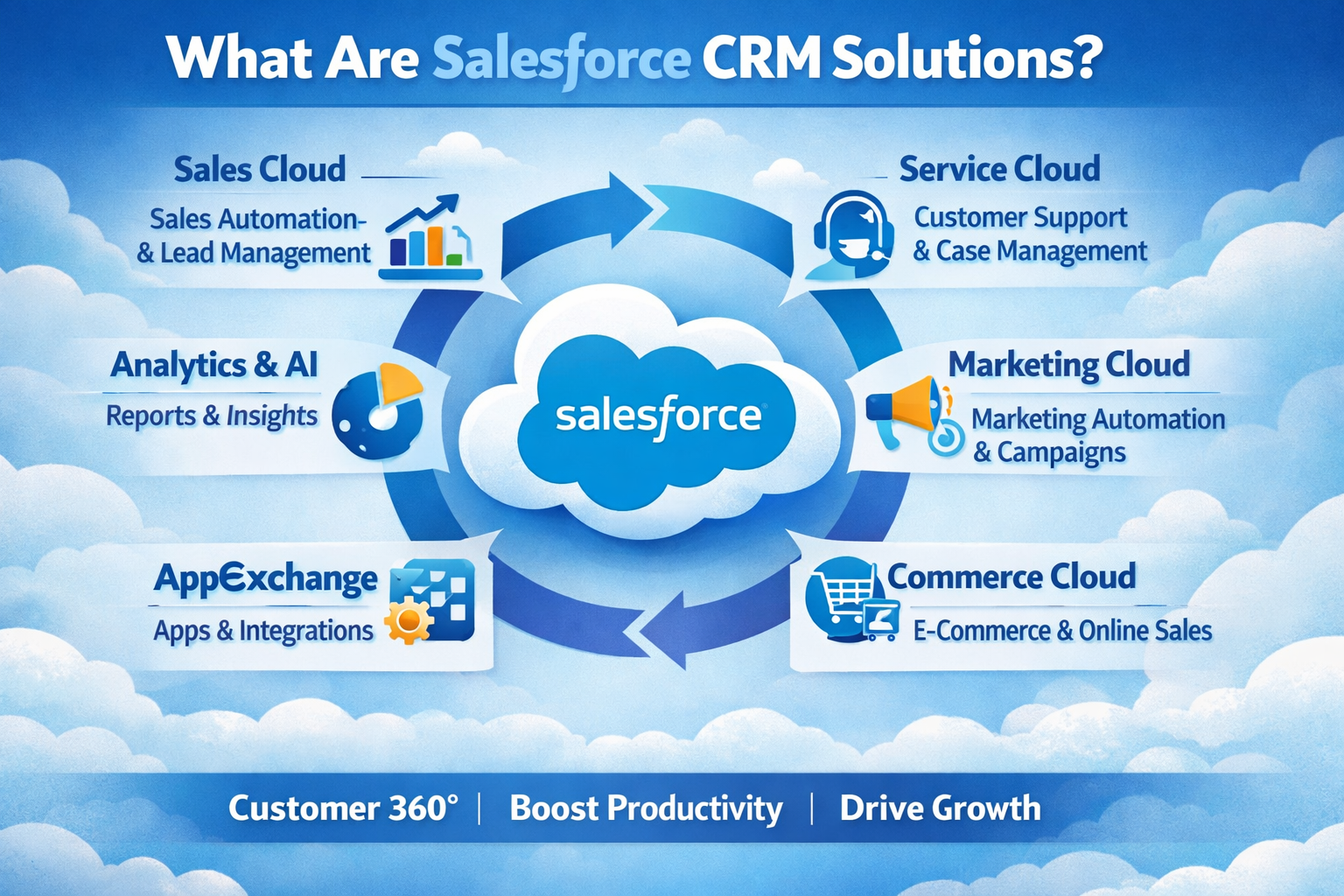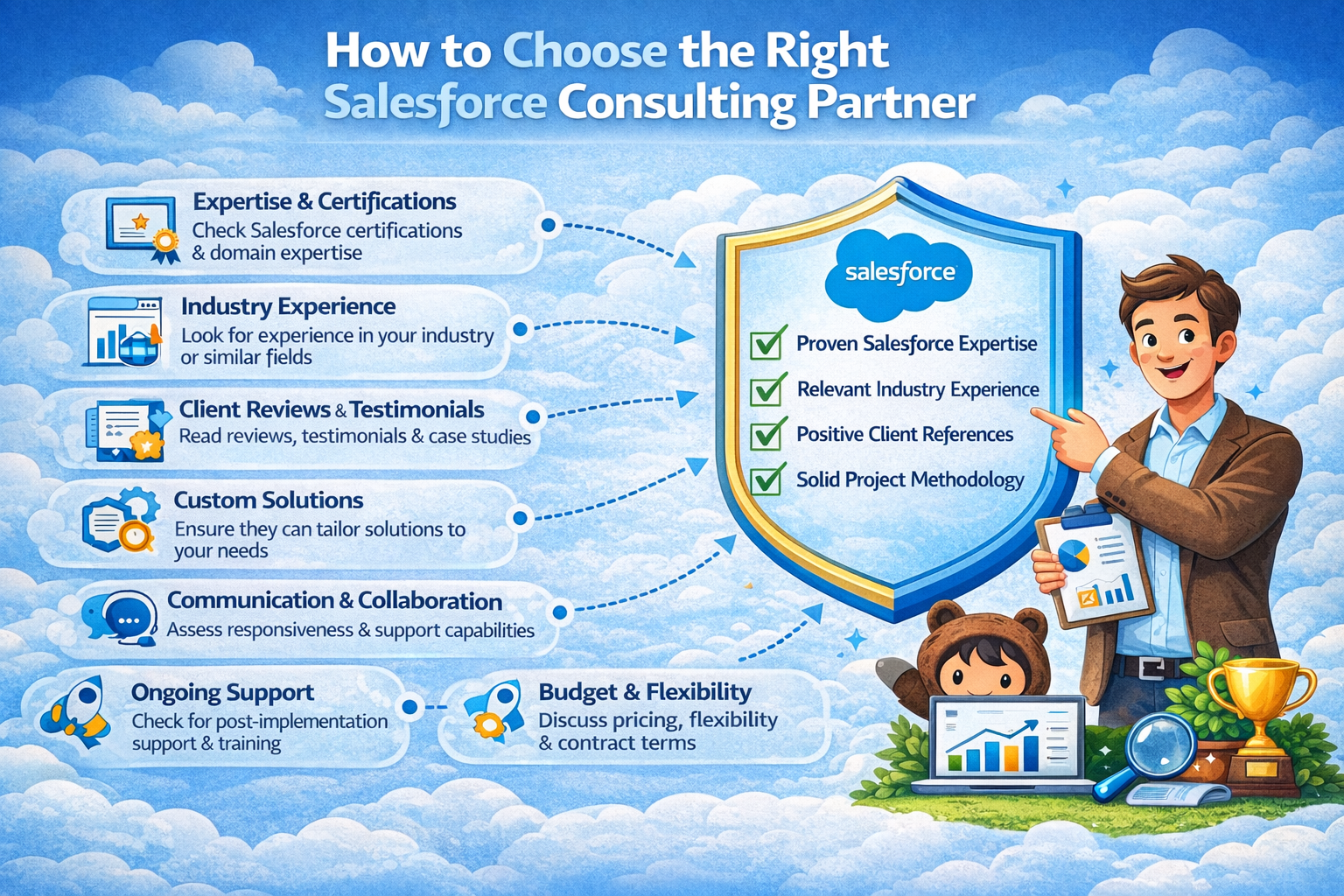
Customer relationships make or break businesses. But let's be honest—most companies are a complete mess behind the scenes. Their customer data is scattered across a dozen spreadsheets, and Bob from sales tells customers one thing, while Bob from sales tells customers another. At the same time, Sarah from support says something totally different, and everyone's doing mind-numbing data entry that makes them want to quit. Sure, 91% of businesses with more than 10 employees use a CRM, but most treat it like an expensive address book. Salesforce CRM solutions became the market leader because they actually solve these headaches rather than organize them.
This disconnect between what CRM promises and what companies actually get. It's bleeding money. Lost deals, wasted time, customers jumping ship to competitors. Today's buyers are spoiled (and they should be). They expect you to know their history without asking. They want instant answers at 2 AM. They'll start a conversation on Twitter and expect you to continue it seamlessly by phone. You can't deliver this with Post-it notes and good intentions—you need a real strategy backed by the right tech.

Think of Salesforce CRM solutions as your business's memory, assistant, and fortune teller rolled into one cloud-based system. They handle all your customer stuff—sales, service, marketing, the works—in one place. No more jumping between ten different programs. Everything talks to everything else, tasks happen automatically, and you can actually see what's going on across your entire company. Every customer interaction gets better because everyone has the full picture.
We used to run our business on hope and Post-it notes. Customer data lived everywhere except where you needed it. Tribal knowledge ruled—lose key people, lose key relationships.
Enter CRM: the business equivalent of perfect recall. Every interaction tracked, every opportunity highlighted, every follow-up automated. But calling it just "customer storage" is like calling a smartphone just a "calling device."
Case in point: A startup I advise used its CRM's behavior-tracking to spot enterprise clients researching implementation guides. That trigger launched targeted outreach, resulting in three Fortune 500 prospects converting. Old school methods? They'd still be cold calling.
Today's buyers operate like secret agents. They research silently, test multiple vendors simultaneously, and form opinions before saying hello. They'll message you on Twitter, email your support, and call sales—expecting everyone to be on the same page. Try coordinating that with filing cabinets.
The math is undeniable. CRM delivers $8.71 per dollar invested. Sales velocity jumps 29%. Non-users? Still searching their email for "that important thread from last month."
Salesforce isn't one big monolithic thing—it's more like a Swiss Army knife with different tools for different jobs.
Sales Cloud is usually where companies dive in first. Picture having X-ray vision into your entire sales pipeline. You see which deals are hot, which are cooling off, and exactly what to do next. My favorite feature? The AI that basically whispers, "call this person now, they're ready to buy." Spooky accurate.
Service Cloud turns customer support from that department everyone avoids into your secret weapon. All channels funnel into one screen—email, chat, phone, social media, smoke signals (okay, not that last one). Agents see everything about a customer instantly. No more "let me transfer you" nightmares.
Marketing Cloud is where things get really fun. You can build customer journeys that adapt in real-time. Customer clicks on shoes? They get shoe content. Abandons cart? Friendly reminder with a discount. Opens emails at 2 AM? Night owl messaging. It's like having a marketing team that never sleeps.
Commerce Cloud runs online stores that actually work. B2B, B2C, doesn't matter. It handles massive traffic spikes without crashing (looking at you, every other platform during Black Friday). The AI recommendations are scary good—like Amazon-level "how did you know I needed that?" good.
What makes this powerful is how they talk to each other. Marketing finds a lead, Sales closes it, Service keeps them happy, Commerce handles reorders. It's beautiful when it works.
Okay, real talk—I used to think "customer engagement" was just buzzword bingo. Then I saw Salesforce in action at a client's office. Mind. Blown.
Unified Customer Profiles solve the nightmare of scattered info. Before Salesforce, this company had customer data spread across 7 systems. SEVEN! Service reps played detective while customers waited on hold. Now? Click one button, see everything. Customer calls feel like catching up with an old friend who actually remembers your conversations.
AI-Powered Personalization is basically cheating at business. Einstein (Salesforce's AI) watches patterns and makes predictions. "Hey, this customer usually orders monthly but hasn't in six weeks—maybe check in?" Or "This prospect just viewed your pricing page three times—they're ready to talk." One client increased sales 23% just by following Einstein's suggestions. Not bad for a robot.
Omnichannel Orchestration sounds fancy, but it's simple—start chatting on Facebook, continue by email, finish on phone, and nothing gets lost. The system remembers everything. Customers love not repeating themselves. Agents love looking competent.
Proactive Engagement flips the script entirely. Why wait for stuff to break? IoT sensors tell you equipment needs service before it fails. Purchase patterns reveal unhappy customers before they leave. It's like having a crystal ball, except it actually works.
Real companies see real results: 27% better retention, 32% happier customers, 25% lower service costs. Those aren't made-up numbers—I've seen the reports.
Let's skip the fluff and talk about features that actually matter:
Process Automation is my personal favorite. Remember the approval chain that took 17 emails and 3 weeks? Now they happen automatically. Set rules once, let them run forever. I helped one company automate its entire quote-to-cash process. What took days now takes hours.
Analytics and Reporting went from "what happened last month" to "what's happening right now and what should we do about it." Einstein Analytics even explains insights in plain English. Tableau makes gorgeous visualizations that executives actually understand.
Mobile Everything because work happens everywhere. The apps aren't some stripped-down garbage—they're fully functional. Update deals at the airport. Approve discounts from your kid's recital. Check dashboards during boring meetings (we all do it).
AI Throughout via Einstein touches everything. Lead scoring tells you who to call first. Opportunity insights warn about deals going sideways. Case routing sends tickets to the right expert. It's like having a genius assistant who never takes a vacation.
Forget the marketing fluff—here's what really happens when companies get Salesforce right.
Sales Productivity Soars when reps stop drowning in paperwork. No more typing the same info into three systems. No more forgetting to follow up. The boring stuff happens automatically, so reps have time to sell things. One software company I know saw reps increase selling time by 40%. Guess what happened to revenue?
Customers Stick Around when you treat them right. Complete history means personalized service. Predictive analytics catch problems early. A telecom company reduced customer defection by 27% just by acting on Salesforce insights before customers got fed up.
Operations Run Smoother across the board. Marketing launches campaigns in hours, not weeks. Service resolves issues faster. Sales quotes prices instantly. It compounds—one manufacturer cut costs 35% through automation. That's money straight to the bottom line.
Decisions Get Smarter because you have actual data. Real-time dashboards show what's working. AI finds patterns humans miss. No more arguing about gut feelings in meetings—the numbers tell the story.
I've seen enough train wrecks to know what works. Pay attention to these or pay the price later.
Crystal Clear Goals beat vague wishes every time. "We need CRM" fails. "Cut quote time in half" succeeds. Every decision should tie back to specific business outcomes. Otherwise, you're just buying expensive software.
Executive Buy-In isn't optional. When the CEO uses Salesforce publicly and celebrates wins, everyone pays attention. When they don't, good luck getting anyone else to care.
Users First sounds obvious, but it's constantly ignored. The people who'll use this daily know what's broken. Include them early. Listen to their feedback. Make them champions, not victims.
Data Quality can't be fixed later. Garbage in means garbage out forever. Clean first, migrate second. Set rules to keep it clean. One bad import destroys credibility permanently.

Choosing wrong here hurts. Bad partners waste money, time, and momentum. Here's how to pick winners.
Industry Knowledge beats general expertise. Partners who know manufacturing speak your language. They've solved your problems before. They bring templates and best practices that actually apply. Always call their references.
Real Credentials matter, but aren't everything. Certified architects and developers show serious investment. But also ask about specific experience with your needs. Lots of certifications mean nothing if they've never been used in your industry.
Chemistry counts more than most admit. You'll work together for months. If early meetings feel forced or they talk more than listen, run. When requirements change (they always do), you need partners who adapt, not argue.
The right Salesforce consulting partner helps align CRM technology with long-term business strategy, ensuring your investment delivers measurable results.
Every project hits snags. Knowing them helps you prepare.
People won't use it; it kills more CRM projects than anything technical. They're comfortable with spreadsheets. Change is scary. Show them exactly how it makes their life easier. Celebrate early wins loudly. Make heroes of power users.
Data Migration Sucks way more than expected. Nothing maps cleanly. Duplicates everywhere. Missing fields. Double your time estimate, then add a buffer. Sometimes starting fresh beats migrating junk.
Systems won't talk because integration is always harder than vendors claim. Document everything early. Test constantly. Have Plan B ready.
The future's coming fast. Here's what to prep for.
AI Everywhere means every click gets smarter. Conversations with systems will feel natural. Predictions get scarier and more accurate. Automation handles more complexity. Get your team comfortable with AI colleagues now.
Instant Everything because waiting is so 2020. Remember waiting until Monday morning to see last week's numbers? Yeah, nobody does that anymore. Everything's instant now. Your competitor just lowered prices? You'll know in minutes, not days. Customer complained on social media? Your service team's already on it. If you're still running weekly reports, you're basically driving a horse and buggy on the highway.
Privacy-First Design matters now. Privacy used to be something only lawyers cared about. Not anymore. Regular people actually read those privacy pop-ups now. They want to know what you're doing with their info. Smart companies figured out that being upfront about data—showing customers exactly what you collect and letting them control it—actually makes people trust you more. Turns out honesty is still the best policy, even in tech.
Salesforce CRM solutions can completely change how you work with customers. But buying software is just step one. The companies winning with CRM have transformed how they think about customer relationships.
They connect all their systems, automate the repetitive stuff, and actually use their data. Meanwhile, others keep juggling spreadsheets, wondering why customers leave.
Success requires the right partner who gets your business. At AD Infosystem, we've helped companies move from CRM struggles to CRM success by focusing on what matters: clear goals, user adoption, and continuous improvement.
Customer expectations aren't slowing down. The tools exist to deliver incredible experiences profitably. The question is whether you'll use them or watch competitors pull ahead.